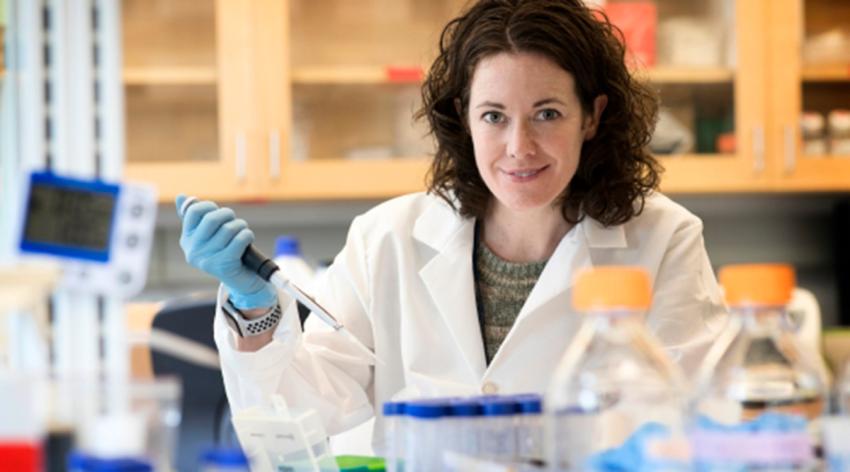
Editor’s Note: This is the first in a two-part series exploring the promise and limitations of the field of personalized medicine. The second part will focus on issues around equity and access to care.
Deep in the maze of laboratories on the 205-year-old campus of the University of Virginia (UVA) in Charlottesville, Audrey Putelo, a fourth-year biomedical sciences PhD candidate, spends her days studying how giving antibiotics to mice with breast cancer — thus disrupting their gut bacteria — may influence breast tumor metastasis. She hopes her research will someday inform how breast tumor metastasis is understood and treated in humans.
Putelo is part of a team of graduate students studying under Melanie Rutkowski, PhD, associate professor of Microbiology, Immunology, and Cancer Biology at UVA, who are conducting experiments to understand how differences in the diversity and health of the bacteria in the gut — known as the microbiome — impact breast and ovarian cancer outcomes.
“Thinking about how the microbiome reflects our environment is a more holistic way to think about health and disease,” Putelo says. “Immune responses to cancer are complex, and adding the microbiome into the equation enables us to understand how different settings dictate tumor metastasis.”
Rutkowski’s hope is that, someday, these basic science experiments will reveal a link between gut health and cancer that can be translated into preventive health strategies and therapeutics to reduce cancer metastasis.
Because gut health is specific to an individual and is influenced by a wide range of factors, any related therapeutics would be personalized to the individual patient.
These experiments are contributing to the knowledge fueling the emerging field known as personalized or precision medicine.
Broadly, personalized medicine uses a person’s genetics, diet, environment, and lifestyle to guide the prevention, diagnosis, and treatment of disease. In practice, a person’s health care team uses therapeutics — pharmaceuticals, radiation therapy, surgeries, or lifestyle and diet interventions — specifically tailored to the patient’s individual body and disease.
The field is already well established in oncology and has helped make dramatic improvements in cancer treatment and outcomes over the past two decades, but some researchers say that the medical field has just scratched the surface of the potential that personalized medicine has to improve health and health care overall.
Rutkowski started on her journey to personalized medicine as a postdoc by asking the question, “Why do some diseases affect people differently?” Answering that question, whether through her research into the microbiome or for any variety of factors influencing health, she says, “opens a world of possibilities.”
Revolutionizing cancer care
In recent decades, overall incidence of cancer has increased in the United States, particularly among people under the age of 50, but mortality has declined by about 33% since 1991, according to the American Cancer Society (ACS). Researchers attribute this to a combination of factors, including improved prevention and early screening for some cancers.
But experts also cite personalized medicine as playing a major role in making cancer treatment more effective.
“Over the last decade, we’ve recognized that all cancers — even of the same origin — are not the same,” says James Broach, PhD, distinguished professor and chair of the Department of Biochemistry and Molecular Biology and director of the Institute for Personalized Medicine at Penn State College of Medicine in Hershey, Pennsylvania. “By identifying genetic drivers of a particular cancer and applying genomics to those tissues, clinicians are able to determine with a high sense of accuracy the likely outcome and select treatments based on what mutations are present in that particular cancer.”
In recent years, the steepest declines in cancer deaths were seen in melanoma, in part because of advances in immunotherapy, a type of personalized medicine that involves using medications that help a person’s own immune system recognize and destroy cancer cells more effectively, according to ACS. Targeted therapies, another type of personalized medicine that uses medications geared toward attacking the specific cancer cells present in the patient, have also driven progress against some types of leukemia and lymphoma (blood cancers).
At Penn State, researchers at the Institute for Personalized Medicine are working to further the knowledge about and treatment options for a variety of cancers, including blood cancers.
Specifically, Broach’s team is collaborating with researchers from other institutions, including Columbia University, Mayo Clinic, and the University of Texas MD Anderson Cancer Center, among others, to advance the use of Optical Genomic Mapping, an innovative imaging technology that can evaluate DNA with more precision than conventional approaches.
These personalized medicine advances in cancer care have not only improved mortality, but have also helped to reduce the burden on patients by sparing them more emotionally and physically taxing, and less precise, treatments. Genetic testing can also be used to detect risk for certain cancers before a person is diagnosed. For example, the identification of the BRCA1 and 2 genes indicates a high hereditary risk of developing breast and ovarian cancers.
Researchers at Penn State and elsewhere also are working with clinicians to identify patients who report having family members who had the same type of cancer or disease. The more genetic samples they can analyze, the more it increases their chances of identifying specific genes that play a role in disease, Broach explains.
Personalized medicine approaches to cancer can also go beyond genetics. For example, in Rutkowski’s lab at UVA, graduate students are running experiments to test the hypothesis that dysbiosis — the imbalance of the bacterial composition of the gut — could lead to metabolic defects, which could, in turn, cause cancers to spread more quickly throughout the body.
“You always hear, ‘You are what you eat,’” Rutkowski says. “Well, you are, literally, what you eat … [With the thousands of microorganisms that inhabit our bodies,] we’re more of a meta-organism than a human.”
Rutkowski believes more research could help individuals make more informed decisions about their diets to improve the makeup of their microbiomes, thus helping to protect their overall health, including risk of cancer metastasis.

She also recognizes that making changes to the microbiome is not as simple as it seems. A wide variety of factors influence microbiome balance, including the neighborhood a person lives in, where their vegetables were grown, the type of processing their food goes through, as well as various socioeconomic, genetic, and psychological factors involved in diet and lifestyle.
But Rutkowski still hopes that greater knowledge can help move the needle toward a healthier society. This will require integration of basic and clinical sciences, as well as strengthening communication to the public and policymakers about what the science reveals.
Tailoring medicines to individual patients
The use of specific drugs to target a particular genetic makeup requires an understanding of how pharmaceuticals interact differently with different genomes. And just as cancer drugs can be targeted for specific cancer mutations, other medications can also be tailored to the inherited genetics that make a person more or less likely to respond or develop adverse effects. This practice of tailoring medications based on inherited genetics is known as pharmacogenomics and its uses extend far beyond cancer treatment.
“[The field of pharmacogenomics] really launched after the mapping of the human genome [in 2003],” says Pamala Jacobson, PharmD, FCCP, a distinguished professor in the Department of Experimental and Clinical Pharmacology and director of the Institute of Personalized Medicine at the University of Minnesota College of Pharmacy in Minneapolis. “It’s turned out using genetic variation is helpful in making medication and dose selection decisions.”
Jacobson first became interested in pharmacogenomics before it was well recognized as a clinical tool because of her work in stem cell and kidney transplantation.
“Patients who receive kidneys or stem cell transplants are quite sick, and they’re recipients of drugs, many with a low therapeutic index,” says Jacobson, referring to when small variations in dose can cause serious and dangerous adverse effects, such as in the cases with chemotherapy and immunosuppressants. “There’s always been this need to be more mindful and thoughtful and individualized when we give these individuals medications.”
Researchers have identified genetic markers that can predict whether certain drugs will be effective or are more likely to have negative side effects, or even life-threatening toxicities.
A person’s DNA can also influence several factors in how the body reacts to different drugs. Certain genetic variation in DNA influences how easily a drug can be taken into tissues and cells, or how quickly the liver processes and eliminates it from the body. A drug that is processed or broken down too slowly can cause serious side effects and therefore would require a lower dose. If the drug is broken down too quickly, it may be ineffective, in which case, a higher dose would be appropriate. For some medications, the risk of adverse effects is so high that the drug should not be used at all. With pharmacogenomics, the clinician takes a DNA sample (of blood, saliva, or a cheek swab) from the patient and sends it to a lab to be tested for specific DNA markers that can indicate what kinds of considerations should be taken when prescribing risky medications.
At the University of Minnesota College of Pharmacy, all students are offered voluntary and free pharmacogenomic educational testing in their first year of the program so they can get a more personalized understanding of how the testing works and what their own genetic markers indicate for certain medications. Jacobson says that 90% of her students opt for the pharmacogenomic testing and are intrigued to learn more about how they are likely to react to various medications. Understanding their own pharmacogenomic risk enhances their education and prepares them to apply it to their patients, she notes.
Unlike genetic testing for hereditary disease risk, pharmacogenomic testing primarily evaluates genes related to drug metabolism and transport, and immune reactions, for the purpose of tailoring medications in a treatment plan. With pharmacogenomic testing, students and patients won't discover a genetic risk for an incurable disease, Jacobson explains, noting that this is a common misunderstanding and concern.
Currently, the Clinical Pharmacogenetics Implementation Consortium (CPIC®), an international group of volunteers dedicated to facilitating pharmacogenetic testing for patient care, offers guidelines for 26 gene/drug interactions.
While pharmacogenetic testing is not yet widely used outside of academic medical centers, Jacobson says that the field has taken off in recent years, particularly in the areas of oncology, mental health, and cardiology.
“It started out as just a few genetic variants associated with pediatric cancer drugs and it’s blossomed into [26] different guidelines on variants that affect so many different classes of drugs now,” she says. “As the research expands, it’s so exciting. Will there eventually be a genetic variant for every drug? Not likely. But [we’re discovering] more and more.”
Innovative research but limited accessibility
While cancer care and pharmacogenomics are leading the way in personalized medicine, researchers and clinicians across the country are rapidly adding to their body of knowledge. For example:
- MDPI, a publisher of open-access journals, has published nearly 6,000 papers in its Journal of Personalized Medicine since it was founded in 2011. And several academic medical centers have created institutes dedicated to advancing personalized medicine in a variety of fields.
- In December 2023, the Food and Drug Administration approved the first genetic test to identify an elevated risk of developing opioid use disorder, which is intended to be ordered by physicians before prescribing opioids for acute pain following a surgery.
- Broach is collaborating with a group of researchers at Penn State who have identified several causative gene mutations in patients with inherited amyotrophic lateral sclerosis (ALS, also known as Lou Gehrig’s disease) — a fatal, neurodegenerative disease. These mutations can be used for screening people who have family members with ALS to inform them of their likelihood of developing the disease.
- At Icahn School of Medicine at Mount Sinai in New York City, the Charles Bronfman Institute for Personalized Medicine has launched a project to collect samples and conduct genomic sequencing for one million patients of diverse ethnicities, races, and backgrounds over five years to significantly add to the data informing personalized medicine.
The Mount Sinai project highlights one of the main limitations of personalized medicine: the lack of diverse genetic data in research.
“Most genomic studies today have focused on Americans of European descent,” Broach says. “It’s important to make the advances that apply to European Americans also apply to a broader swath of the population. I think that is a challenge that is being met, but can be met more aggressively.”
Broach envisions a future in which every person has their genome sequenced, with the information stored in electronic medical records to inform clinical care.
But, he acknowledges that, even as science advances, the health care system struggles to make those advances accessible, particularly to people with low incomes and those who already face barriers to accessing health care.
“Our medical system is not really geared to be able to provide high-end tech on a broad scale,” Broach says. “The big issue is going to be in delivery.”
In part two of this series, AAMCNews will dig into the equitable delivery of and access to personalized medicine, particularly for communities of color and rural communities who experience disparities in health care.
